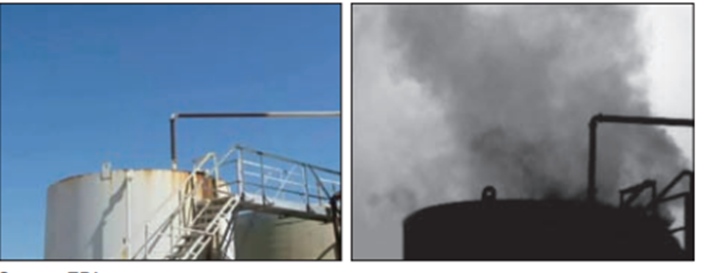 Earlier this week the Center for American Progress held an event to raise awareness about the impacts of methane. “Opportunities for Curbing Methane Pollution” brought together representatives from a wide spectrum of backgrounds: state and federal policy experts, environmental advocates, and labor. While each had their own reasons, be them safety, jobs, health, climate, all agreed that reducing methane emissions from the US oil and gas sector was both critical and possible. That sentiment was captured nicely by Judi Greenwald from the Department of Energy:
Earlier this week the Center for American Progress held an event to raise awareness about the impacts of methane. “Opportunities for Curbing Methane Pollution” brought together representatives from a wide spectrum of backgrounds: state and federal policy experts, environmental advocates, and labor. While each had their own reasons, be them safety, jobs, health, climate, all agreed that reducing methane emissions from the US oil and gas sector was both critical and possible. That sentiment was captured nicely by Judi Greenwald from the Department of Energy:
“For most people it’s primarily about methane and… these greenhouse gas reductions, but I think there are a lot of other [policy] drivers. In some instances it’s really the safety benefit that’s most important…. [And] there are a lot of other reasons to do this. So you get agreement on actions, but you might actually not get agreement on each [policy] driver.”
Reducing methane emissions is good for the climate
Carol Browner, Senior Fellow at the Center for American Progress and former Administrator of the Environmental Protection Agency, offered opening remarks during which she said methane is a “very serious climate problem” because of its potency as a greenhouse gas. Methane is 84 times more potent than carbon dioxide over a 20 year time frame and short-term climate forcers like methane will drive a significant portion of the climate change we experience in our lifetime.
Mary Nichols, Chairwoman of the California Air Resources Board (CARB), told us California didn’t initially have methane in their original climate plan (known as the Scoping Plan), which focused on carbon dioxide. After looking at the state’s long term goals, however, it was evident that drastic reductions of methane and other short term climate pollutants were needed by 2030 to get where we need to be on climate change by mid-century.
EDF agrees with Nichols’ that we must address both carbon dioxide AND methane in order to stabilize the climate. We must urgently address methane emissions in order to achieve all the climate benefits we can in the short term as we transition to deeper reductions in all climate pollutants in the long-term. Reaching state and national climate change goals depends on tackling the methane issue.
Smart methane policy creates jobs, reduces waste, and is cost-effective
As Mike Langford, the National President of the Utility Workers Union of America (UWUA), said, there is a huge job potential in repairing pipelines and reducing leaks. This can employ hundreds of thousands of workers, including many veterans, and that’s why Langford called California’s law passed earlier this year to reduce methane leaks from pipelines the “most common sense thing” we can do.
My colleague Mark Brownstein agreed and added this job potential extends across all aspects of oil and natural gas production, transportation, and distribution; American small businesses are leading the production of technology and providing services needed to capture methane from the oil and gas industry. As a recent study showed, driving methane reductions will provide a boost to the U.S. manufacturing sector and lead to the creation of good-paying jobs in the very areas of the country where emissions reductions are most needed. And another study tells us we can reduce methane pollution from oil and gas operations by 40 percent for one penny on average per thousand cubic feet of gas produced. A bargain by any measure.
The discussion reinforced that addressing methane emissions increases efficiency and reduces waste. It’s in everyone’s best interest to eliminate the estimated $1.8 billion worth of methane currently leaked into the air. Let’s make sure methane is working for our economy, and not against the climate.
All speakers agreed: We have enough data to act, and the solutions are clear and achievable today. The EPA has the authority to regulate methane emissions from oil and gas – the leading source of industrial methane in the U.S. – and considering the numerous benefits, we can’t wait to address this threat to our economy, our health, and our climate.
Photo Source: EPA









